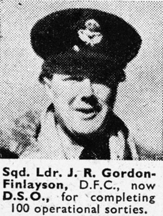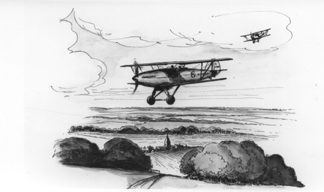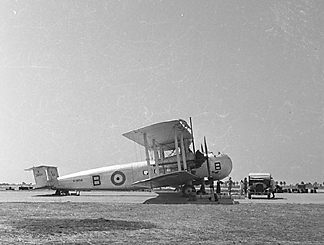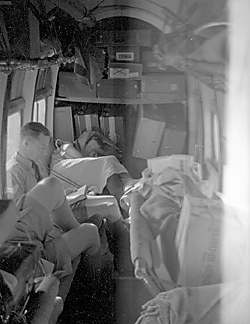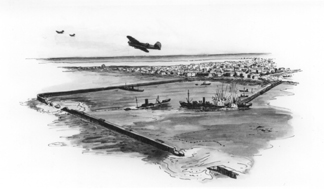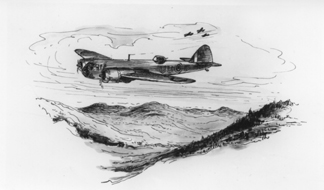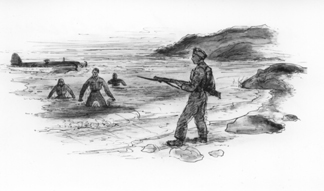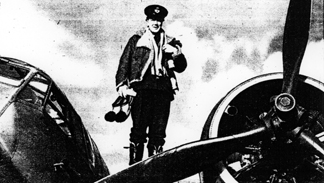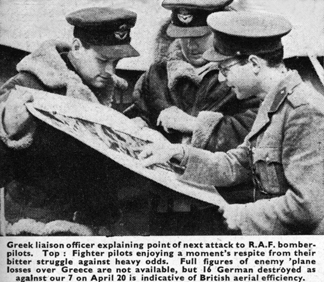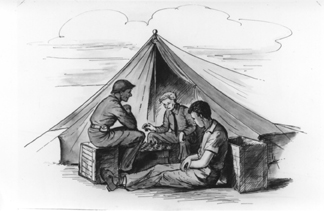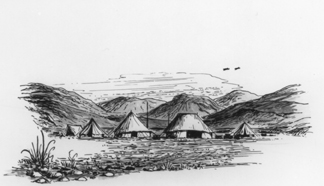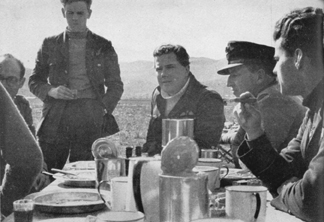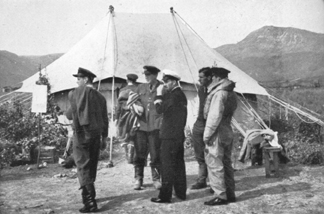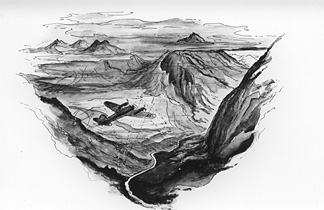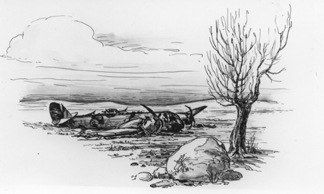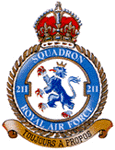 |
 |
||||||||||||||||
|
Squadron Leader James Richmond Gordon-Finlayson 36078 RAF DSO DFC 1914—1990 James Richmond Gordon-Finlayson, elder son of General Sir Robert Gordon-Finlayson KCB CMG DSO and Lady Mary Gordon-Finlayson OBE, born 19 August 1914. From Winchester he took law at Pembroke College, Cambridge. There he also pursued an interest in matters military, not only qualifying in Artillery in the Officer Training Corps in 1934 but also joining the University Air Squadron, where he qualified as a pilot on 9 July that year. With his degree alone, Gordon-Finlayson met the requirements for a permanent commission in the RAF. Though elected to the Inner Temple in 1935, the dash of Service life called more strongly, and it was to the RAF that he was soon to apply.
Into the RAF
Promoted to Flying Officer on 19 April 1937 with seniority from 19 January 1937, at the end of June he was posted to No 83 Squadron, then at RAF Turnhouse near Edinburgh with their Hawker Hinds. As tensions rose in Europe and in the Middle East, the Squadron moved South to Scampton in March 1938. To the Middle East In December 1938, 113 Squadron’s flying schedule was quite busy with bombing, reconnaissance, or formation flying exercises on most days until the middle of the month. Then, on 13 December, came a hint of fresh adventure. In Vickers Wellesley L2702 of 223 Squadron with Acting Flight Lieutenant Bush as pilot, Gordon-Finlayson flew south to Kenya and a four day visit to Nairobi. Returning to Heliopolis on 22 December, he briefly resumed 113 Squadron duties. His handful of flights in the last week of December included K6668, one of the Hawker Hinds sold to the Afghan Air Force in 1939. By the end of the year, the 24 year-old F/O Gordon-Finlayson had recorded 617hrs 20 min service flying for a total of 550 hours 45 min as pilot. His assessment for the year to June saw him rated an “above the average” pilot and pilot-navigator: significant recognition in RAF terms then and now. On 19 October came more recognition: advancement to Acting Flight Lieutenant. To Kenya: Governor’s ADC
Pilot Officer Bernard J Lynch was another of the passengers aboard K3604 ‘B’ on the journey south. An Intelligence Officer, Lynch was an enthusiastic and expert photographer, as is his son Sandeha, to whom I am indebted for access to these fine images. In this shot of the forward part of the Valentia's cabin, at left an airman reclines while just past his knees, a well-groomed RAF Corporal reads. Beyond him, another man lies dozing. On the right, almost obscured, a fourth passenger is also reading. GF himself is not evident in these shots by Lynch but from the Log Books of both men there is no doubt this is the same flight. Arriving in Nairobi on 9 January 1939, he was to take up duties as Aide-de-camp to His Excellency the Governor of Kenya, Air Chief Marshal Sir Robert Brooke-Popham. Brook’ham, then on the RAF retired list, was to return to duty in late 1939 and later served as Air Commander in Chief, Far East in the difficult days of 1940 and 1941. With his ADC post came Gordon-Finlayson’s formal promotion to Flight Lieutenant, gazetted on 19 April 1939 with effect from 19 January. While his official duties kept him from service flying, other good fortune came to pass: he met Suzanne Sim. And so to war On 3 September the war came. That same day, Gordon-Finlayson arrived in Cairo aboard Imperial Airways’ Short S23 Empire class flying boat Corinna to resume his RAF duties. He was back at Heliopolis with 113 Squadron a week later, converting quickly to the Bristol Blenheim on 10 September 1939. To the Desert and 211 Squadron Thus he made acquaintance with the Greyhounds, in the desert that was to be their home for the next year. October and November saw plenty of flying on cross-country and bombing exercises, with a variety of AC, LAC and Sgt aircrew including old 211 hands from Hind days (LAC Grierson, eg) and others like Farrington and LAC Richmond, to become familiar in the Greece adventure. In the nature of things, even peace-time postings are not of long duration. Spending a year and a half on the Squadron, first as Flight Lieutenant, then as Acting Squadron Leader and Squadron Leader, Gordon-Finlayson was to see them through much adventure and difficulty and be twice decorated for his efforts. He also gained two nicknames, used equally freely by the Squadron: "GF" and "The Bish". Meanwhile, he had won another campaign of a quite different sort: engagement and marriage to Suzanne. On 29 November, war notwithstanding, they boarded an Imperial Airways DH.91 Albatross to fly home for the wedding and 10 days leave from 1 to 11 December 1939. By 13 December he was back in Egypt, resuming flying duties on 15 December. January and February 1940 were both busy flying months, with aerial photography exercises (six, including low obliques) and bombing exercises (ten, at low level and at 10,000 feet) mainly out of El Daba and up to 3 hr 55 min duration. The interspersed trips to "Helio" (Heliopolis) and Ismailia may have come as welcome breaks. At this time, Gordon-Finlayson as Flight Lieutenant was Officer Commanding ‘A’ Flight, signing his own Log Book thus at the end of February. While the notion of permanent aircrew had been promulgated in early 1939 (AMO A.17/39), it was the Summer of 1940 before they were to be accorded the rank of Sergeant (AMO A.416/40 of 27 June). So in the Middle East of early and mid 1940, The Bish flew with scratch crews, made up of those Corporals, LACs and ACs qualified as Air Observers and/or Wireless Op/Gunners. Among them, familiar names appear, and advance accordingly by year’s end: Cpl (later Sgt) Richmond and LAC Page (later Sgt Page) for example. Over the course of the year, crewing settled somewhat. Sgt Leary and Sgt Jones, then Sgt Richmond and Sgt Jones, appear more frequently as his crew. Soon after the belated entry of Italy into the war and the opening of hostilities in the Middle East on 11 June 1940, TH Wisdom arrived in Cairo as a war correspondent. He was to spend much of his time in the Middle East with 211 Squadron. In Wings Over Olympus, Wisdom painted an engrossing picture of the Squadron from the early days of the Desert War and on to the grimmer struggle in Greece.
The Squadron had undertaken a workload of increasing intensity at their forward landing grounds in the Western Desert. When Squadron Leader Bax was shot down and taken PoW in early September 1940, it was GF who was promoted to take over, initially as Acting Squadron Leader. By then he was an experienced fighting airman of great determination and skill. The gazettal of his step up came quickly (London Gazette No 34949 20 September 1940). Carrying out numerous operations from June to November 1940, he successfully force-landed damaged aircraft on four occasions, once at night, and once with the port engine dead and the starboard engine afire. On at least one occasion, he managed to nurse his aircraft back to the Squadron’s airfield on one engine. Within a few days, sometimes the next day, he was back in the air. Gordon-Finlayson, Gerry Davies and Arthur Geary flew their first operation as a crew on 21 September, a night raid on Sidi Barrani against intense AA. For the rest of September and October, most of GFs operations were flown either with P/O Davies and P/O Geary or with Sgt Richmond and Sgt Jones, and once or twice with Davies and Jones. Off to Greece on 23 November with Davies and Geary, thereafter they flew practically every operation together. Ultimately they were to complete at least 70 operations as a crew. “One of that small but valiant band...”
The story of his triumphant return, with Davies and Geary, from yet another successful forced-landing, this time on Corfu, is a minor classic.
The tale is recounted with gusto in WIngs Over Olympus, in The Sphere, in the Official History (Richards, The Fight at Odds) and in Parade Middle East Weekly with this jewel kept safe for 60 odd years:
“The Squadron-Leader in command of a bomber reported "missing, feared killed" has just made his way back to his base in Greece with his crew after being marooned on an island in the Aegean Sea. The return through Greece was in the nature of a royal welcome, and the RAF crew were mobbed at every village by the delighted Greeks who loaded them down with presents. Note the bottle of wine and shoes!” [Parade Vol 2 No 17, 7 Dec 1940]
“Duke” Delaney on the left, GF centre and the unnamed Greek liaison officer often mistaken for Embros on the right.
By the end of December 1940, GF had accomplished 1022 service flying hours. In January 1941, he was awarded a well-deserved DFC, the first of the Greek campaign: Air Ministry From February 1941 the Squadron was stationed as far forward as it was possible to get and remain in Greece. Paramythia had in fact been briefly taken by the Italians in their first abortive advance from Albania back in November.
A Greek interpreter to the left, Gerry Davies second left, GF centre looking relaxed, Curly Fabian the New Zealander next to him, and furthest right Alan Godfrey (to be the sole survivor of the Easter Sunday raid). From Wings Over Olympus.
Buck Buchanan, left, GF, Cliff (815 Squadron FAA), Paddy Kavanagh and Sutton. Outside the Operations tent, most likely. In March 1941, GF was decorated again and promoted out of the Squadron to command the newly forming Eastern Wing of British Air Forces Greece. He flew his last operation with them on 13 March, a night raid on Valona with Bevington-Smith navigating and Arthur Geary in the turret. Wing Commander Gordon-Finlayson DSO DFC had by then accomplished more than 100 operational sorties, all with 211 Squadron.
The difficult conditions of air operations over the mountains of Northern Greece in the harsh winter of 1940-41 have been graphically described elsewhere, and with telling brevity in his DSO citation. Air Ministry AVM Longmore’s despatch on air operations for 1941 was just as to the point: Wing Commander JR Gordon-Finlayson DSO DFC, commanding No 211 Squadron, and later the Eastern Wing: A fine leader and an inspiration to his Squadron, with which he had completed over one hundred raids. GF had accomplished much. The disastrous Easter Sunday raid of 13 April 1941 on which Davies, Geary and so many others were lost was still to come, but he could not be there to help them.
And afterwards Posted to the RAF Staff College, Bracknell as Assistant Commandant in December 1956, he was made Air Commodore in July 1958. In May 1960 came what was to be the last post: acting Air Vice-Marshal and Director-General Personnel Services at the age of 46. In the New Year, he was made AVM. Retiring from that posting in 1963 as a comparatively young Air Vice-Marshal, an old predilection for verse saw him revisit those remarkable days in Greece: the loss of “his” Squadron and “his” crew still lay heavy with him. Thus he set about a more personal memorial in the manner of a certain sort of Englishman now perhaps lost to us: his slim volume of verse, Epitaph For a Squadron, was published in 1965. It makes poignant reading. Finding Civvy Street not wholly to his liking, GF moved to Spain and took to sailing around the Med from Gibraltar. In the later years of his life he returned to England a widower, but was to find happiness once more with his fourth wife Lou. Air Vice-Marshal James Richmond Gordon-Finlayson DSO DFC FC (Greece) died after a short illness on 3 March 1990. His passing was noted by the Daily Telegraph and by The Times, on 6 March 1990. Lou passed away in January 2005. Today his son lives in South Africa while his daughter and the eldest of his grandsons are based in the UK. “A restless spirit, bold yet temperate...” These characteristics have remained bright in the memory of 211 Squadron members, whether officer, NCO or airman. He is mentioned on many of the pages of this history, and appears in a number of official photographs and others shared by Squadron members: Bristol Blenheim I; The Middle East; By great good fortune, after drafting this page I found another copy of The Bish’s little verse book commemorating the Squadron. Inscribed by him in 1987 to a former Sgt Observer of the Squadron, the late GA “Jimmy” Riddle, it came with a set of photographic copies of the original sketches which illustrate his book, most of which are now included here. Sources Baird W correspondence Clark CFR & Clark DR 211 Squadron RAF, Greece, 1940—1941: An Observer's Notes and Recollections (Canberra 1998). www.211squadron.org © D Clark & others 1998—2025 |
||||||||||||||||
